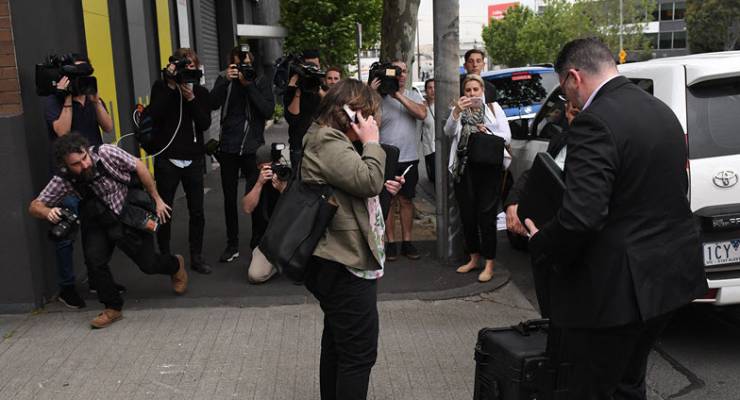
A political staffer resigned last night over doing what politicals staffers do every day — leaked some details to the press to ensure coverage.
Employment Minister Michaelia Cash’s advisor David De Garis quit after Cash had told Senate estimates her office hadn’t tipped journalists off about the Australian Federal Police raid on the Australian Workers Union earlier this week. Cash had denied her office’s involvement five times before BuzzFeed dropped the bombshell that, in fact, it was one of the minister’s staffers who’d told journalists in Melbourne and Sydney an hour before the raids with details, “emphasising that it would take place at a union office”. De Garis resigned after BuzzFeed‘s story was published.
Cash has said she didn’t authorise the tip-off, and has called for an AFP investigation into the leak.
But all this really just reveals the grubby way political reporting is done.
The routine protection of the source of political drops and tips is ingrained in press galleries and newsrooms around the country. Spinner for former NSW Premier Imre Salusinszky wrote about the culture of political drops and exclusives in his column last month. He described the cycle of “exclusive” stories governments — using his own experience in the NSW government — will hand over to friendly news outlets to make their announcements.
“The system of drops is really a kind of bullying — it was always understood, usually tacitly, that refusing to play the game would result in more ‘smash ups’, or negative stories. This is why the vast majority of drops go to the tabloid Daily Telegraph: partly out of respect for its print circulation, but mostly out of fear of its retribution … A drop is neither more nor less than a confidential transaction between a government official and a third party, designed to benefit both. One gets an exclusive story that draws an audience, the other gets favourable news coverage.”
In response to yesterday’s story, Salusinszky tweeted it was: “good for the public to learn about the grubby backroom deals between politicians and sections of the media. There is so much more.”
And it looks like some journos are scrambling to protect the deals they do with politicians and their staffers, seeing it as an issue of trust and protecting sources.
After the revelations yesterday, News Corp press gallery reporters notably criticised the revelation of a “source”. The Daily Telegraph‘s Sharri Markson suggested on Twitter that protecting staffers handing out tips gets you cabinet leaks, while The Advertiser‘s Andrew Hough and the Herald Sun‘s Paul Tatnell both described BuzzFeed‘s revelation as a betrayal.

Sky News’ Samantha Maiden, who almost without fail delivered an “exclusive” drop for News Corp Sunday papers when she worked for the group in the gallery, came down on the opposite side to her former colleagues, though: “Staffer is not exactly a whistleblower. Why should journos participate in a cover up?” she tweeted.








Having not picked up ‘The Advertiser’ for a couple of decades I could only guess at the deterioration of journalistic standards. After reading Hough’s huffy tweet I cannot even understand the second sentence.
“I cannot even understand the second sentence.”
I think he is saying that even if the Minister is lying, or corrupt, or has been misled by her office staff, that it is not worth revealing the source because the punters (readers of his newspaper) are not interested, and thus it doesn’t matter…..
I suspect that if it was a Labor minister it would matter very much!
It’s funny, isn’t it, in modern “journalism”, how “the raid and personal associative cat’s-paw aggrandisment is more important than the fact of the abused, manipulated, broken system; as long as it’s working for you”?
…. isn’t it?
Speaking about journalism and journalistic standards, when was Imre Salusinszki Premier of NSW?
Salusinszky was a relatively ethical, transparent and competent (and unusually literate) press secretary to Mike Baird, a similarly reasonable Premier as far as communication went. They both got fucked over by The Fuckergraph and the talkback grubs when they stopped dancing to their vile tune. It’s not about policy; it’s about information flow. The Ruperts, the Rat Hadleys…they don’t care what you believe. They just want your undivided, pliable attention. Withdraw from ‘the game’, and they’ll fuck you up.
“Staffer is not exactly a whistleblower”.
Professional journalists . . . hock deep in deceit, valueless purveyors of misinformation.
Or, as some independent news websites call them, stenographers.
The government’s orchestrated stunt – an AFP raid to discredit Labor and to make a spectacular seizure of documents (which were available anyway on request – and which had been requested during the Heydon TURC) is the key issue.
The “drop” itself or just doing my job angle – alarming as it is – should not obscure the collusion between government and AFP to make political mileage out of a public bust. Surely, moreover, it is illegal to tip-off anyone – even a third party – that a police raid is scheduled, even if the police are somehow keen to involve you.